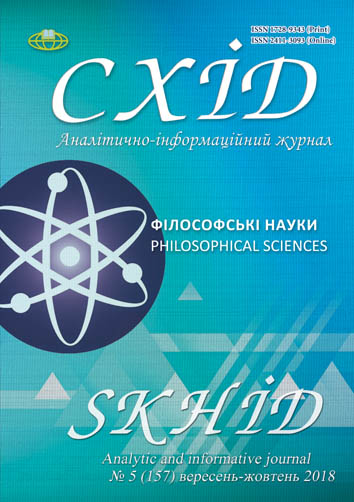Theodor W. Adorno. Actuality of philosophy (Translation from German)
DOI:
https://doi.org/10.21847/1728-9343.2018.5(157).149108Keywords:
philosophy, аctuality, project, total, being, subject, history, interpretation, realityAbstract
A young philosopher neo-marxist Theodor Adorno read his work «Actuality of Philosophy» in the summer of 1931 as a іnaugural lecture of privatdozent of the Goethe University of Frankfurt am Main. In this lecture young Adorno critically analyzed to the philosophy of positivism, neo-kantianism, the philosophy of life and the phenomenological learning of Edmund Husserl, theoretically influential currents and schools of German philosophy, which had the status of dominant theoretical knowledge in society. Adorno also carried out the neo-marxist critique of the ontological projects of such German philosophers as Max Scheler and Martin Heidegger, who were subjected to the theoretically influence of the Husserl’s learning. According to Adorno these ontological projects through the primary presence in itself an irrational elements of human existence, form the kind of subjective thinking that can not effectively combine its subject with external reality. Another object of Adorno's critique was the philosophy of the Vienna Circle, which, in his conviction, although he was concerned with the consideration of man as the subject of empirical knowledge, but she did not notice the true essence of his existence as a historical creature. Neo-marxist Adorno proposed to see the joint scientism of phenomenology, the philosophy of empirio criticism and the Vienna circle such a theoretical tendency that could not provide apodictic answers to the basic and substantive questions of human existence as historically fluid. So this theory proves its ideological imperfection and historical untopicality. After this critique, Adorno proposed his neo-marxist vision of a theory that should replace the previous theory as dominant in society. This new materialist philosophy has a being-dialectic relationship with social practice and should facilitate to independent interpretation by the subject to being senses and historical images. This philosophy forms with the help of concepts the understanding of social reality as a historical and to abolish the claims of any philosophy to the status of official theory. In this lecture Adorno also presented the ideological conception of his learning of human being, whose essence in a modified form was later explored in the Negative Dialectics (1966), in his main philosophical work.Downloads
Downloads
Published
How to Cite
Issue
Section
License
Copyright (c) 2018 Vitaliy Bryzhnik

This work is licensed under a Creative Commons Attribution-NonCommercial-NoDerivatives 4.0 International License.
1. Authors bear responsibility for the accuracy of facts, quotations, numbers and names used.
2. Manuscripts are not sent back.
3. The publisher does not always agree with the authors' opinion.
4. The authors reserve the right to authorship of the work and pass the first publication right of this work to the journal under the terms of a Creative Commons Attribution-NonCommercial-NoDerivatives 4.0 International License. This license allows others to distribute (copy) the published work for non-commercial purposes, provided there is mandatory attribution to its authors and a link to the first publication in our journal.
5. The authors have the right to conclude separate supplement agreements that relate to non-exclusive work distribution in the form in which it has been published by the journal (for example, to upload the work to the online storage of the journal or publish it as part of a monograph), provided that the reference to the first publication of the work in this journal is included.

